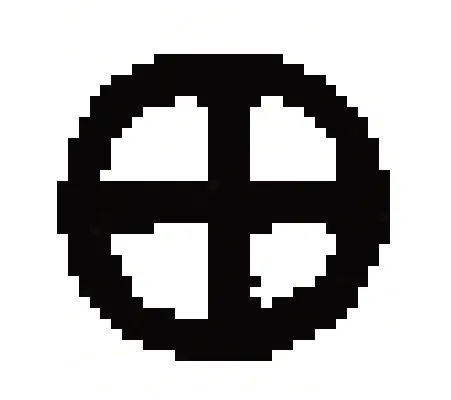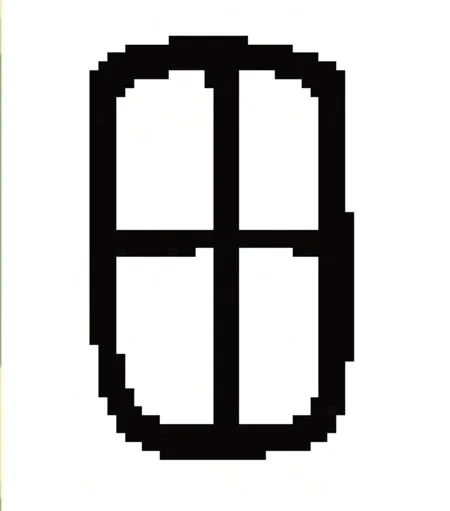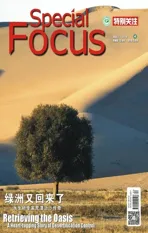Understanding Chinese Characters
2019-05-10ByLiHuatian
By Li Huatian
The Chinese character田 (tián),which means “field” in English,shines light on a plentiful and colorful Chinese culture and conjures up a profound image and the best wishes in Chinese people’s minds.
The character田 originates from ancient Chinese,the Oracle Bone Inscriptions,which appeared in the Shang Dynasty (1600BC—1046BC),the first dynasty in China’s recorded history. Thus it has a very long history of about 3600 years. Then as time goes by,its form was simplified into 田. The periphery large circle口 represents the boarder that encircles田or the fence preventing wild animals from entering,and the cross 十 in the middle signifies the crisscross footpaths or canals in田. From this we can see that the original meaning of 田 is 农田 (nóngtián,farmland or field),which means land for growing crops.
Obviously,the character 田 results from ancient China’s slavery system 井田制 (jǐngtiánzhì,the “nine squares” system of land ownership in ancient China’s slavery society). The king of the Shang Dynasty allocated national land to serf owners,and every serf owner divided one large square into several small fields (like the character 井) and his serfs have to cultivate these fields for him.
Since the basic meaning of the character 田has a lot to do with farming,this character is used in many phrases which are closely linked with agriculture,village life,and peasants,such as田 地 (tiándì,cultivated farmland),田野 (tiányě,open country),田埂 (tiángěng,footpath in a field),田陌 (tiánmò,path in a field),田 间 (tiánjiān,among the fields),田舍 (tiánshè,farmhouse),田垄 (tiánlǒng,ridge),田 赋 [tiánfù,land tax (in ancient China)],田产 (tiánchǎn,land and estate),田父 (tiánfù,old farmer),田家 (tiánjiā,a farming family or a peasant family),田间管理 (tiánjiānguǎnlǐ,field management) ,田径运动 (tiánjìngyùndòng,track and field),田 猎 (tiánliè,hunt),田田 (tiántián,lotus leaves linked together),田园 (tiányuán,countryside),and 田园诗 (tiányuánshī,pastoral poetry).
Nowadays,the character 田 has got a wider range of meaning and every kind of land used for production can be called 田 in Chinese,such as 煤田 (méitián,coal field),气田 (qìtián,gas field),盐 田 (yántián,salt field),or油田 (yóutián,oil field).
Because every crisscross footpath or canal is arranged in perfect order on a large piece of crop land,there is a Chinese idiom 井井有条 (jǐngjǐngyǒutiáo) that means “to be put in the right place or good order.”
When the character 田 is used as a verb,it has the same meaning as 畋 (tián) which means “hunting,” just as Prof. Jiang Lihong (蒋礼鸿),the famous linguist,says in his essay “Read and Remember Words” (读字臆记): There are fields for growing crops,and there are also fields for hunting. The two characters have the same pronunciation but are different words in fact (有树谷之田字,有猎禽之田字,形同而非一字也).
Now as far as I (whose name includes the character田) am concerned,the spelling of the character田 can be explained as the following: ten persons live in the countryside,a small mountain encircles the village,two suns shine brightly up in the sky,and one mouth includes four mouths (十人住一国,一山环四周,双日齐相辉,一口包四口).
I come from a beautiful village surrounded by small hills and lakes. I was born into a fairly large family,in which there are more than 20 cousins of close blood relation. After graduation from high school in the countryside,I became the first in my family to be admitted to a famous university and four years later I was assigned a teaching post at this university. Now I shoulder a sweet burden of family and life. Thus it is obvious that the character 田 mirrors my life to a certain extent.
Note:Li Huatian is a vice professor at School of Foreign Languages,Central China Normal University.

甲骨文“田”Oracle Bone Script

金文“田”Bronze Script

小篆“田”Small Seal Script
